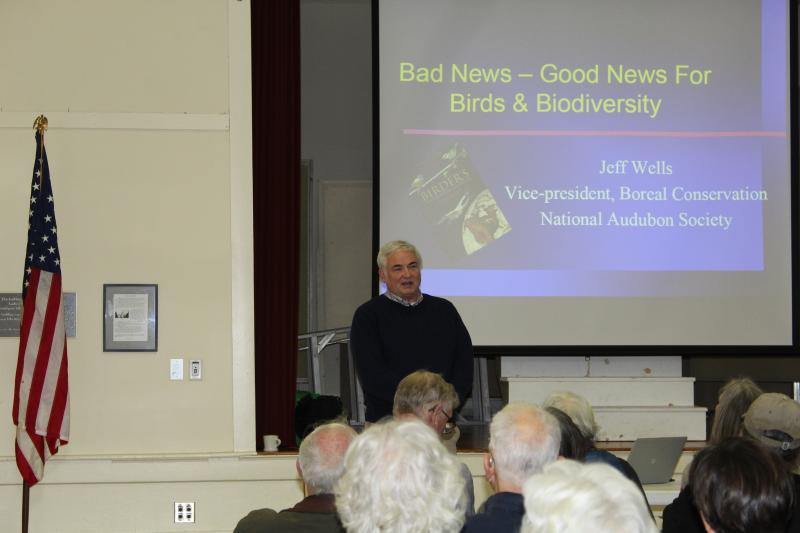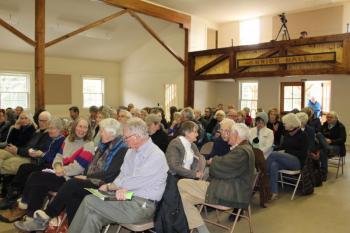At a Boothbay Region Land Trust/Indivisible Boothbay event Friday morning at Southport Town Hall, Dr. Jeff Wells described a dire situation he said climate change has put Maine birds in, especially those along the Atlantic flyway.
Wells is a fellow at Cornell University’s ornithology department, and a vice president of Audubon Society’s Boreal Conservation team. His focus is the birds who spend at least part of the year in the northern boreal forests which ring the top of the world. Many birds who breed and summer in the boreal forest migrate through Maine or spend time in Maine during the year. Over 400 species of birds divide time between the boreal forests, Maine and points south. Half are on lists of concern, from needing protection to threatened to endangered, he said. And forty percent of Maine birds are on some list of conservation concern due to climate change, which leads to habitat loss or degradation, invasive species, or an increase in environmental toxins. In coastal Maine, coastal birds have been extremely hard hit, as have raptors higher up the food chain, Wells said.
Maine lost 869,000 acres of forest between 1980 and 2000, mostly in southern and coastal areas, due to development. Forest-dwelling birds, including many songbirds, are decreasing due to this habitat loss. Wells said there have also been losses of grasslands as farms are turned over to developers, and losses in grassland birds who would have inhabited hayfields and grazing lands.
Part of what is going on with the birds is a small piece of a much larger mass extinction event. Earth has had several major mass extinctions over its natural history, Wells said. The current, Holocene extinction is the sixth extinction after multicellular life arose, and is the only one known to have been caused primarily by human activity.
Human activity that leads to extinctions can include eating certain wild animals, such as the Dodo and large turtles and tortoises; hunting large sea mammals for oil and ivory; toxic chemicals in land, air and water; the loss of wild lands; deliberately introduced species such as cattle, cats and sheep that were harmful to the native species and to wilderness ecosystems, and accidental introduction of harmful species, such as green crabs, rats and Asian Longhorn Beetles; wholesale hunting of natural predators, leaving prey populations weak; overfishing; draining of wetlands; damming rivers for energy and development; deliberate destruction of native species, such as bison, to use land for other purposes; and climate change due to human activity such as burning fossil fuels, which has resulted in sea level warming and rise at the coasts, Wells said.
If the pattern continues, the largest mammals in every continent except Africa will soon be domesticated animals, such as cows, horses and camels, he said. And Africa’s megafauna are also under threat from sport hunting and poaching, despite attempts to conserve the large species.
“A million bird species are in danger of extinction,” Wells warned. “Over 2.9 billion individual birds have been killed by human activity since 1970,” he said, citing a recent article in Audubon Magazine.
However, Wells pointed to bright spots. The recovery of birds affected by DDT toxins, including the bald eagle, shows what can be done if there is the will. Dam removal and river restoration are another example, he said.
“We’re conserving land, we’re protecting species, such as the piping plover, and we are restoring habitat. All of that makes a difference.” He said the new plastics bans will also help.
The goal is a marriage of public action and public policy, Wells said. “When people band together to demand action, public policy changes. It took a single generation to get everyone to recycle. Look where we are now. One of the most dangerous substances in our waterways – plastics – is about to be banned. We have to get the people who are primarily concerned with the issue to take responsibility for it.”
Near the boreal forests, those people are mostly native peoples, he said. Wells said they are taking direct responsibility for the health of the forests, and demanding that the Canadian government scale back industrial developments near the boreal forest.
The venue was changed due to high interest. About 100 people came.































